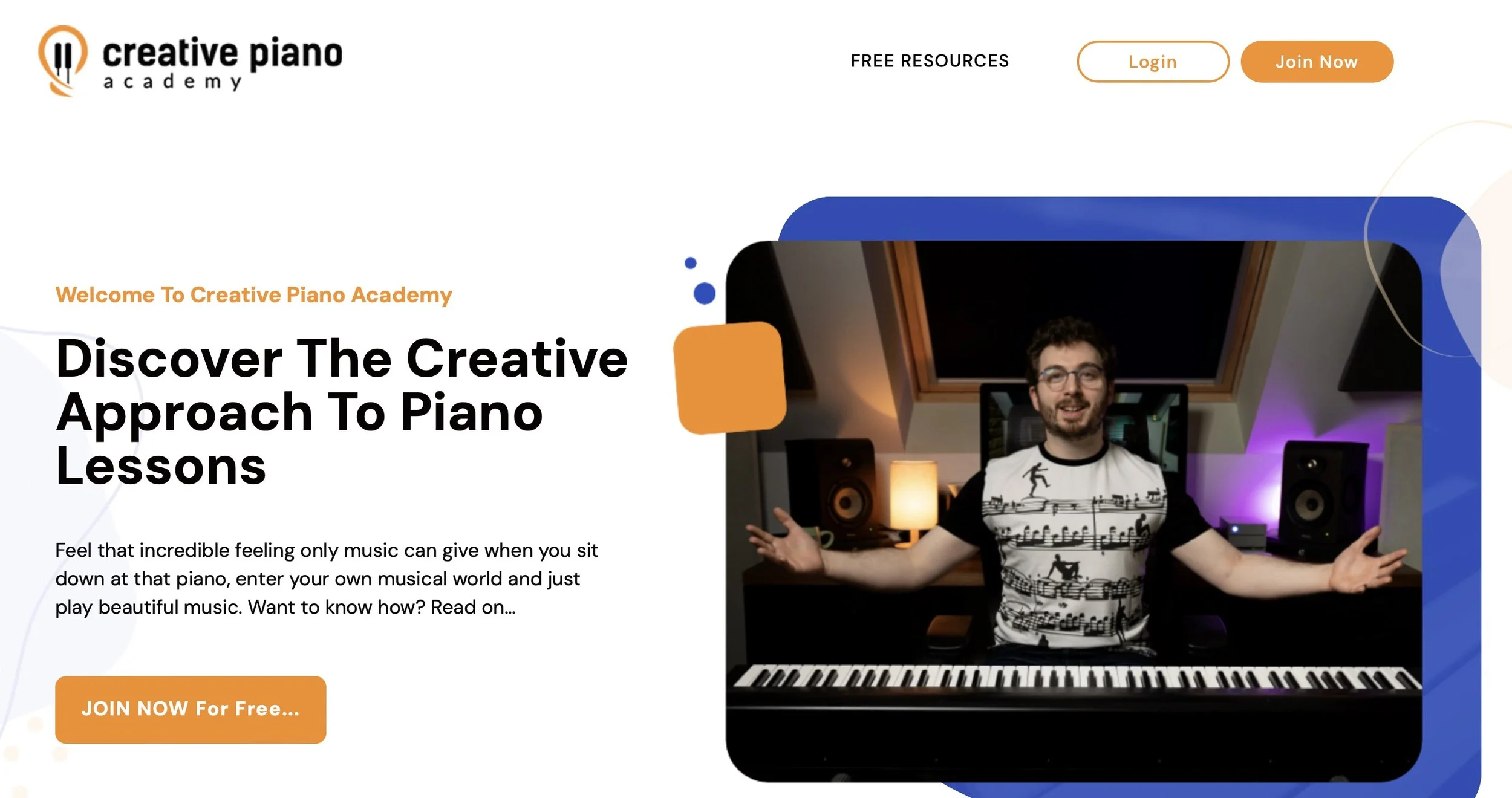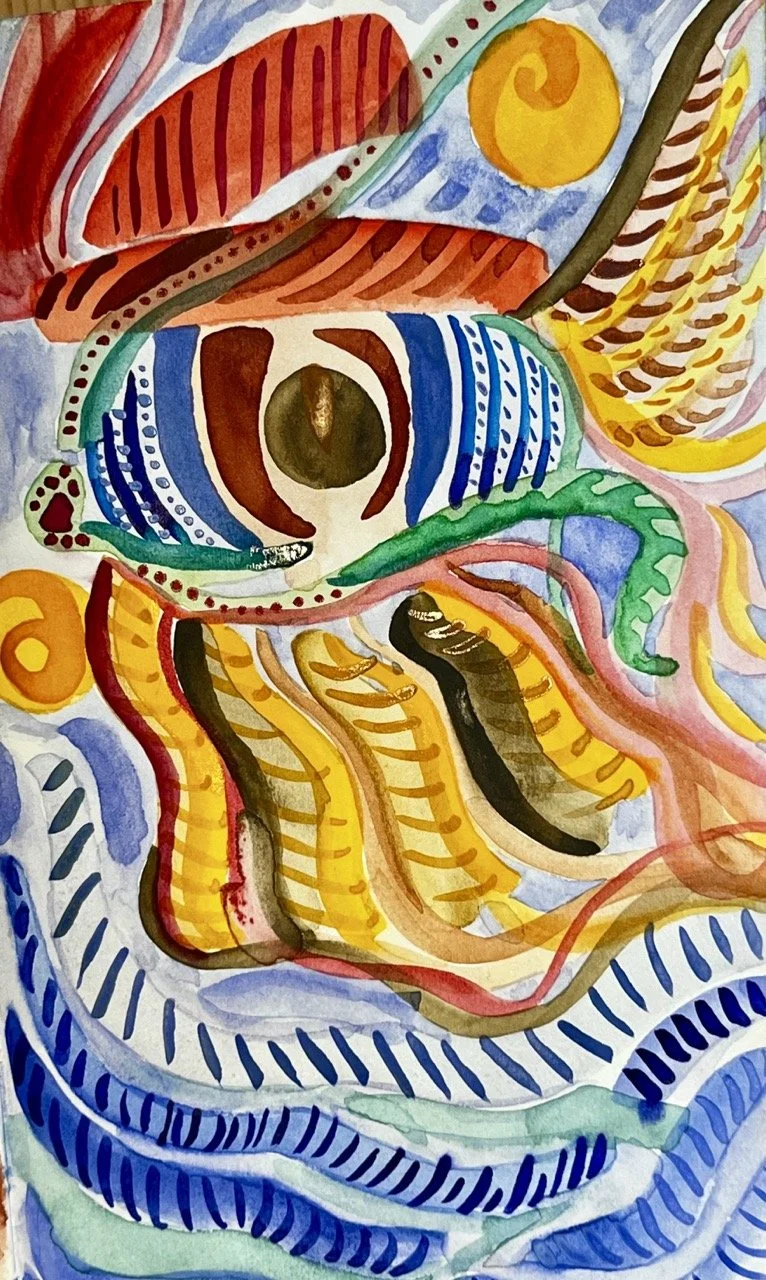The Art of Being a Beginner
I sit down in my partner’s kitchen. It’s Sunday evening, 23:06. I clear the small table — the one that also serves as my workspace — wiping away the last watercolor splashes that didn’t make it onto the paper. Then I set up my cheap Yamaha NP11, the one I bought five years ago for 100 € on Kleinanzeigen.de (Germany’s version of Craigslist).
My MacBook is propped up in front of me, and I load today’s lesson: number 19 out of 60.
Just looking at that number, I already feel like I’ve accomplished something.
Here I am again, after a busy day — regardless of the time — ready to learn something that brings me just 1% closer to the musician I long to be. I’ve finally started a piano course that matches my actual level.
And it’s humbling to admit how long it took me to get here — because for the longest time, I was trying to skip the beginner phase.
The Temptation to Skip Ahead
When I first decided to learn the piano, I joined Open Studio Jazz, a fantastic online platform for jazz musicians. It’s an incredible resource — full of world-class teachers and beautifully structured lessons — but here’s the truth:
I wasn’t ready for it.
I had never really listened to jazz before.
The language of jazz wasn’t something I felt an urge to express.
To be honest, I don’t think I ever truly connected with jazz.
But I had this idea that most of the musicians I admire had either gone through intense classical training or studied jazz.
So I felt that if I wanted to take my craft seriously, I’d need to do what all the pros do — and choose one of those routes. I longed to understand music theory from the ground up, to build a sense of harmony and composition, to develop a feel for music.
I’d only ever heard positive things about the platform, so in November 2024, I signed up, eagerly joined several live classes, and started an “Introductory Piano Pathway.”
However, every class or course I took assumed you’d already spent a decent amount of time at the keys.
I hadn’t.
But I didn’t want to face the shame of being a beginner.
I didn’t want to only play the white keys.
I wanted to be thrown in at the deep end — to learn to swim while trying not to drown.
It took me three days to complete what should have been twenty minutes of practice.
And when I came back to the piano each morning, it felt like walking into another punch in the face — another reminder of how far I was from where I wanted to be. I tried to soothe my bruised ego with spiritual wisdom: be patient, drop attachment, embrace the process.
But honestly? It was exhausting. My mental energy was going into managing my frustration, not enjoying the music.
Finding the Right Level
So what happened? Did I learn how to swim — to not drown?
Of course not.
Instead, I dropped the classes after two months.
Picked them back up again another two months later.
Dropped them again.
And each time, I felt like I had failed.
Eventually, I took a long break from the piano.
When I did sit down to play, it was only to “noodle around.”
But strangely, that noodling was what reignited my curiosity.
Each time I managed to play a melody that had been living in my head — even if it was just on the white keys — I felt deeply satisfied. Those little moments of connection reminded me why I wanted to create music in the first place.
I started to experiment:
How could I make a simple chord sound a little richer?
What happens if I shift one note?
Suddenly, I wasn’t chasing perfection — I was exploring.
And that changed everything.
That playful approach helped me fall back in love with the piano.
So I began searching for a truly beginner-friendly course — something structured, yet encouraging. After my experience with Open Studio Jazz, I had eaten my big slice of humble pie.
I could finally say it out loud: I’m a beginner.
I knew I didn’t want to rely solely on random YouTube videos. I wanted a clear learning path — one lesson building on the next — something that would help me grow steadily without overwhelm.
While browsing, I came across The Pianist’s Compass article, “The 9 Best Free Online Piano Lesson Resources in 2025,” which suggested several promising options: Piano Marvel, Pianolessons.com, and Creative Piano Academy.
Just from the name, I secretly already knew which one I was drawn to,… and after checking them all out, my choice was clear: Josef Sykora’s Creative Piano Academy.
Why this is my favorite
What I love most about Josef’s teaching is how human it feels. His lessons are calm, patient, and genuine — it’s like learning from a good friend who really wants you to succeed. There’s no pressure, no ego. Just steady guidance.
He starts right from the ground up — no assumptions about what you already know — and that makes his approach feel incredibly empowering. Each lesson builds gently on the last, helping you sound musical even with simple techniques. You start to enjoy how you sound, instead of feeling constantly behind.
This course starts from zero — real beginner ground.
Within seven days, I’d completed the first 18 lessons. And for once, I didn’t feel like a failure. A small part of me wanted to skip ahead, to chase a challenge again.
But the larger, wiser part of me felt grateful — grateful to finally be ahead of class, not behind.
That feeling,… of progress, of ease… builds confidence.
It makes me want to return to the piano every single day.
Why Choosing a True Beginner Course Works Better
When I finally allowed myself to start from the actual beginning, something shifted — not just in how I learned, but in how I felt while learning.
That feeling of small, steady success turned out to be incredibly powerful.
It wasn’t just emotional — it was neurological.
Every time you complete a task successfully, your brain releases dopamine, the neurotransmitter that signals reward. That tiny hit of satisfaction tells your brain, “Do this again.” And so you do.
That’s how consistency is built — not through discipline alone, but through small wins that feel good enough to repeat.
So when you’re choosing a beginner course (whether it’s piano, painting, or anything else) pick one where you can get it right about 80 to 85% of the time.
That sweet spot keeps your brain challenged, but not overwhelmed. You feel accomplished, capable, and motivated — and that’s what keeps you coming back.
When we pick something too advanced, the opposite happens:
Instead of feeling rewarded, we feel defeated. The brain doesn’t get that dopamine feedback — it gets a stress response instead. And slowly, the joy drains out of the process.
That’s when the inner critic gets loud, whispering:
You’re not good enough. You’ll never get there.
But you can silence that voice by starting where you truly are, and celebrating each step forward as a success worth repeating.
The Ego of the Beginner
When I look back, I realize why I resisted being a beginner. It wasn’t laziness… it was pride.
Some part of me had divided musicians into two categories:
The “real” ones — the successful, skilled performers — and the amateurs, the ones who are “still learning.”
I didn’t want to belong to the second group.
There’s a perfectionist inside me that hides behind high standards.
She wants to be good immediately.
But that perfectionism is not devotion to my craft…
… it’s actually a clever disguise of my fear of vulnerability.
True mastery requires humility.
And humility starts with being okay with small steps, with simple songs, with clumsy beginnings.
I wish I could have learned this faster… but I guess having all this social media perfection overload also wasn’t exactly fertile ground for humbleness and being “okay, with being vulnerable”.
Algorithms that make the already skilled hyper-visible, popping up endlessly in our feeds, create a truly “vulnerability-hostile” environment.
This is one reason I am writing this blog:
To provide some counterweight to all the perfection that is out there.
To reinsert vulnerability into how we show up on the internet, even though the algorithm doesn’t reward it.
It feels like part of my creative responsibility to remind people like you and me that not everything can be instantly skilled, perfect, or presented as a polished outcome.
So in the next section, I’ll share some pointers on how to inhabit that vulnerable, ego-challenged state of being a beginner — how to survive it, and even grow from it.
How to Be a Beginner (Without Losing Your Soul)
As you might have realized by now, being a beginner isn’t just about learning a skill.
It’s about learning how to manage your mind, your expectations, your emotions.
Here’s what I’ve learned in a nutshell:
CHOOSE THE RIGHT LEVEL Pick materials where you can succeed most of the time.
MUSICALITY OVER TECHNIQUE Focus on making music feel alive, not just hitting the right notes
BUILD SMALL WINS Let progress be your motivator, not willpower or discipline.
NOTICE YOUR INNER DIALOGUE ... and don’t buy into the negative self talk. Give the inner critic a voice in your journal and balance out its opinions by listing your wins, the areas you are noticing your progress,
CONSISTENCY OVER INTENSITY Small, steady practice builds more than occasional heroic effort.
ALLOW YOURSELF TO BE A BEGINNER Vulnerability is part of learning and what adds soul to your music. It is the foundation your future mastery is build on.
For You — The Artist in Progress
Maybe you, too, are trying to skip the beginner phase.
Maybe you’ve been drawn to courses or projects that are “just a bit” out of reach — not because they serve you, but because you don’t want to look small.
But here’s the paradox:
When you try to look advanced before you’re ready, you rob yourself of the joy of learning.
You trade growth for ego protection.
So instead of rushing, start again.
Choose simplicity. Choose the level that makes you feel safe, capable, and alive.
The magic of being a beginner is not in getting everything right.
It’s in the quiet moments where you surprise yourself —
when your fingers finally remember a chord,
when your hand stops trembling as you paint,
when your voice catches something true.
That’s where art begins.
Not in mastery, but in the willingness to start small… and stay curious.

